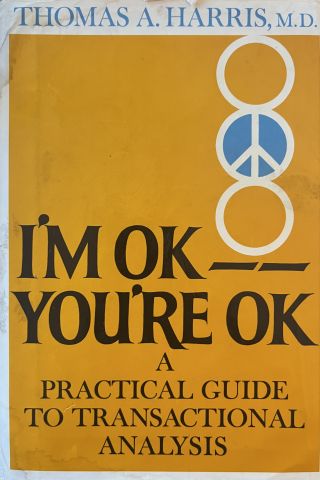You may be familiar with the phrase I’m OK, You’re OK, which was first popularized by Thomas Harris in his book with that title.

Lawrence Cohen
As used by Harris, Okayness means that a person is valued, with their feelings and thoughts acknowledged and considered. If I’m OK, that means I have a basic sense of safety and security. I matter to you. If You’re OK, that means you are a safe person, and a person worthy of my respect. You matter to me.
You’re OK but I’m not OK
Harris notes that it is common for children to feel that their parents are OK because adults demand and receive respect. They demand and receive attention for their statements and their feelings.
At the same time, unfortunately, many children see themselves as not OK, because they are devalued and dismissed by adults. Consider these common phrases: “Because I said so,” “You will understand when you’re older,” “Stop being such a baby,” “No one cares what you think,” “My house my rules,” “Don’t talk back to me,” “You have nothing to be angry about.”
The result of this combination is a feeling by the child that You’re OK but I’m not OK. This perception can carry into adult relationships, leaving the grown up child feeling one down in regard to others, which can lead to passive submission, passive-aggressive rebellion, or explosive resentment.
I’m not OK and you’re not OK
Children can also grow up feeling that You’re not Ok and I’m not OK. This happens when parents do not feel worthwhile and don’t treat their children as being worthwhile, or when children have to be the physical or emotional caretakers for their parents. The parents are not OK because they are immature or volatile, and the children are not OK because, of course, they are not capable of carrying out that adult caretaking role.
If these children grow up continuing to feel I’m not Ok and you’re not OK, then they are likely to avoid closeness or enter into highly conflicted relationships. They have a hard time feeling safe or providing a sense of security to others, though they may also be compulsive caregivers, neglecting their own needs in the process.
Helping children feel I’m OK
The Canadian psychologist Gordon Neufeld talks about the negative impact of conveying to children that they are “too much” (out of control, overly emotional, impossible) or “too little” (not meeting the parent’s expectations). In terms of okayness, these are common ways that parents can block a child from feeling I’m OK. Punishments, time-outs, shaming, and exploding with rage also make children feel not OK.
To foster the I’m OK state, parents can offer empathy, understanding, and compassion. They can acknowledge a child’s wishes and desires even if they can’t be satisfied (I know, you really want that toy, I understand; You wish you could stay up all night playing video games.) Every wish does not have to be granted for a child to feel OK. But the wish does need to be validated. Children need to have their say, even if they can’t always have their way.
Helping children feel You’re OK
To develop a basic sense of You’re OK, children need to know that their parents will take care of their own needs—both practical needs and emotional needs—and not put that burden onto the children. Children do not need their parents to be perfect, but they do need to see parents as competent, emotionally stable, and able to acknowledge and repair mistakes. That means that children need us to do our own work—deal with our depressions, triggers, anxieties, and stresses—without dumping them on the children. It is no surprise that having children is a powerful motivation for many people to begin therapy or engage in self-help practices such as meditation or yoga, so they can be OK themselves and foster okayness in their children.
Of course there is no such thing as being perfectly OK or seeing anyone else as perfectly OK. This is where “good enough” comes into play. The goal is an overall sense that I’m OK and You’re OK, even if there are challenges to that from time to time.
Are we OK?
Besides I’m OK and You’re Ok, I like to add a third category, We’re OK. This means that our relationship is solid. We have a close connection that can withstand bumps and upsets, such as when one of us or both of us is angry or disappointed.
Note how when an adult feels insecure in a relationship, they often ask the other adult, “Are we OK?” Children frequently ask the same question, but they ask it in actions, not in words. Children act up or push limits with all their impulses and emotions to see if the love and connection is strong enough to handle it. (Of course, adults do this too, right?)
One of my heroes, Janusz Korczak, a Polish pediatrician and educator, was known to say to children in the orphanage that he ran, “I am angry with you until lunchtime.” I love this! It conveys genuine emotion and expresses the impact of the child’s behavior, but it also conveys that the rupture in the relationship is not permanent. That is crucial. Adults often forget how sensitive children are to disruptions in connection. A short separation or a small-scale aggravation can feel like the entire relationship is on the line. Again, many adults feel the same way and panic when there is any expression of anger or frustration.
We can foster a sense of We’re OK in children by assuring them that nothing will end our permanent bond, nothing will eradicate our love, nothing will drive us away, even when we need to set a limit or we can’t grant a child’s every desire.


















+ There are no comments
Add yours